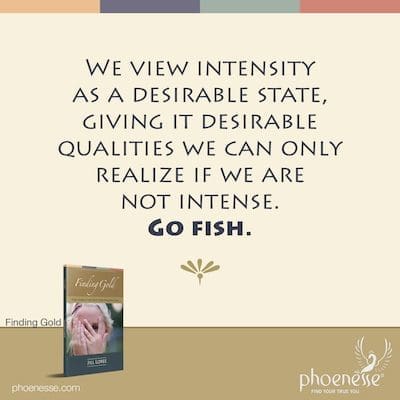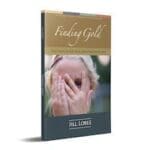To become self-realized means we become aware of the universal cosmic power that is available to us 24/7. We need to know this power exists if we want to have it. But we don’t know what we don’t know. Our obliviousness to its existence is our tragedy. We need to find a way across a new bridge that takes us from what we have previously known to what is possible. This is the smart way to approach anything new, whether we’re talking science or a realization of truth.

Typically though, we’re not ready to do this, falsely believing we need to have clear-cut opinions. We waffle back and forth between a definite Yes and definite No. But we’re never going to discover anything new with an attitude like this. What we need is an attitude more like, “What’s possible? What could be? Let me take an honest look and consider the possibilities in whatever direction I may need to go, without shirking whatever effort I need to make.”
Sounds simple enough. But humans, being the goofy creatures we are, find it exceedingly difficult to take such an approach. So what is blocking our way then to tapping into the great life source is our inability to seriously open up to a line of questioning that will make us open to new truth—perhaps revolutionary, perhaps not—to something that seems to contradict what we have previously known.
It’s not that we’ve “just never thought of it before.” No, we’re actually denying a fact that is right there, simply because we aren’t open to considering it with fresh eyes. And that’s an obstacle. Otherwise, we would just be wide open with curiosity whenever a new possibility presented itself—which is happening, like, all the time.
Our unwillingness to be flexible and consider other options, to instead cling to opinions that half the time aren’t even ours but rather are something we borrow through hearsay, is really about our fear of looking at ourselves.
Here’s another obstacle mucking up the works and blocking self-realization. We are walking contradictions, with one set of attitudes, opinions, thoughts and feelings on the outside where we can consciously get to them, and a whole other set on the inside we can’t quite reach. This discrepancy bars the door to the source, because our minds think it would be a good idea to block off the stuff that’s under wraps.
So the mind can’t relax, it can’t go with the flow. We’re going to need some new tools to pry open the lid on all our mistaken opinions, wrong conclusions, destructive attitudes and crappy emotions that stand between us and that rich nougat center of pleasure supreme.
To experience self-realization is nothing more, nothing less, than realizing all the power that is smack dab in the center of our beings—of ourselves. And it’s a truckload of power, people.
This is a two-pronged power source. First is the way it infinitely revitalizes with a self-perpetuating aliveness. It’s a bottomless cup that just keeps refilling. We can’t even dream of how this could affect someone, having it available if we were no longer blocking it. Our whole lives would dramatically change.
This energy marches to the beat of its own drummer. It’s not personal to us. If conditions are right, it’s gonna flow. That’s just the way it rolls. On the flip side, when conditions aren’t compatible, no go. Clear the hurdles and on it goes again, but often differently from what we might be expecting. It’s going to go according to its unchangeable, built-in laws that are not custom-designed for us. It’s not personal.
Part two of this power source is its freestanding intelligence. If we get this concept, we can integrate with it. This means we have to clear out all that unconscious material we fear and flee from, and become freethinkers ourselves. Our dire need for an authority figure outside ourselves is crippling. And also nuts, since we’ve got everything we could ever need right there inside ourselves. But we block it. But boy oh boy, once we start to make use of this power, there’s nothing in the world to fear any more. Ever.

So let’s dive into yet another way we unwittingly block ourselves from making use of this power. It’s more like a soul climate we’re speaking of here. If we want to be compatible with this universal power, we have to have a state of mind that is totally chill—inner andouter relaxation.
We’re not talking about being immobilized or lacking in energy. This isn’t the kind of relaxation that’s not breathing and responding. Au contraire. This relaxation is rhythmic and effortless, expanding and contracting as though it were breathing. It’s poised and calm, peaceful and yet dynamic. This is not indifference, passivity or laxness. Those are for chumps. This kind of relaxation is not wound up with fear, pride or self-will. Needless to say, this is not a state that many are in the habit of inhabiting.
No, our typical state is more or less to be intense. This, of course, is foreign to—and incompatible with—universal power. Our intensity, pulled taut as a piano wire, has the final effect of making us immobile, paralyzed and passive. This we must learn to work out of our souls.
In our black-and-white way of seeing the world, we, as usual, have a misunderstanding about these things. We think that the more intense we are, the more serious, responsible and focused we will be. In the reverse direction, we think the less intense we are, the more irresponsible, frivolous and distraught we’ll be. Spoiler alert: this isn’t true. In fact, as these things tend to go, just the opposite is actually true.
If we want to give our total attention to what’s in front of us, our psyches need to be fluid and not taut. We need to have undivided attention, clear motives, wholeness and integrity. This can’t happen when we have opposing forces dividing ourselves in two, and fears hiding behind our inner corners. There needs to be a lightness to the way our psychic material flows. This is what will make more energy available for us to invest into our lives. And we’ll feel less exhausted after we expend a bunch of energy on something. It’s that feeling of a “good tired.”
Instead, we’ve gotten to where our normal state of mind is so taut and intense, it’s become our second nature. But this is not natural. Topping this is the fact we now view intensity as a desirable state, giving it all the wonderful spiritual qualities we are aspiring to—yepper, all those qualities we can only realize if we are not intense. Go fish.
All our cute little neurotic ways are the result of—and result in—our artificial intensity, which we are half-consciously nursing along. We do this because the immature parts of ourselves want to be special, better than the rest, self-important. We try to draw attention to ourselves by making everything seem so very damned important. Drama, drama, drama.
We may only do this inside ourselves and not let others see this is going on. All mental illness and emotional imbalance totters on this deliberate game of intensification we are playing within.
This is one of those things we have to believe to see. But if we focus our attention on it, we’ll find it. With some exposure, our intensity will start to feel foreign and unnatural. But what’s always the first step to letting something go? Bingo—awareness.
It’s going to feel like we are stepping out of an internal straightjacket. Danger, Will Robinson! We’re also going to feel very exposed without it. Then we’ll figure out that all we’re exposing ourselves to is the revitalizing life stream of the cosmos. The weight of that constricting jacket has been causing a dent in our soul substance, which can now spring back. This dent is made up of too-tightly-held convictions, exaggerated emotions, overreactions and tight muscles. How can the life force flow in the face of all that? Tightness on any level—mental, emotional or physical—gradually leads to illness, decay and death. So resiliency must be restored, starting from any direction, any level.
We halfway think that intensity is needed for experiencing pleasure. Don’t be deceived. Intensity is an attitude of the ego, and it stops the ego from letting go. Pleasure, however, requires that our involuntary processes let go, which can’t happen to the extent the ego is holding on. We need to not take ourselves so seriously. We need to not be confused with thinking this means we are then inconsequential. Lightness is desirable and relates to a greater influx of universal power. This brings heightened pleasure, humor and laughter. The divine then lives in us and we live in it. That’s what being self-realized is all about.

Long before we will be able to totally let go of unhealthy intensity, we can make progress by witnessing it, paying attention to it. This alone will loosen the chokehold of it around our necks and let in new life energy.
This constriction makes us withdrawn, even as there may be a franticness that comes with the artificial intensity. The herky-jerkiness of this, which may show up in our movements or lack thereof, keeps the inner powers from moving through us and moving us.
When we become more whole and more unified, this cosmic stream will want to flow out from us. We will want to move towards life and towards others. And that, right there, is what we were afraid of. We think that holding back and shrinking into ourselves is what keeps us secure. On the surface, of course, we may have come up with mannerisms that mask this. But this doesn’t make for honest contact with other people. And that bit of separation, that’s what causes misery—because it reflects this gap inside ourselves. This gap then lives between us and others, and between the self and truth.
Now hear this: the universal power is 100% trustworthy. Not trusting it is sheer folly. What we shouldn’t be trusting is our fear of our own selves, which only exists because, in a place or two, we still deceive ourselves. But if we decide to stop this, we save ourselves in a warm bath of our own cosmic powers. Salvation never sounded so good.
We also obstruct our path to good-and-happy through false goodness. Another word for this is sentimentality. Wound together here are our innate and genuine desires to be loving and outgoing, which are twisted up with the way we withhold ourselves, keeping a tight leash on our ego.
It’s our natural urge to let go and love, trusting the flow of inner processes. But then fear, pride and self-will—the trifecta of Lower Self faults—set up a roadblock. In this way, real feelings are stopped and we feel guilty for how we’ve numbed ourselves. If we were feeling natural, vibrant, real feelings, over-intensity would never be necessary. As it is, we feel an obligation to manufacture something that looks like the way we ought to feel, since we can’t genuinely do so.
Enter: sentimentality. This kind of false goodness stands more in our way than admitting that, in the moment, we feel nothing. That, despite our wishes, we’re not feeling the love. If we could admit this, we could find our way out of the paper bag we are in. But being all sentimental about things, we think we’re already out.
If we can find our way to the honest admission that we desire to love but don’t, the next step is to find the fragment that actually doesn’t want any part of this: “I don’t want to feel, and I don’t want to love.” It’s there. It’s real. So to be in reality, we have to find it. Because what’s real right now is our resistance to feeling and to loving. And if we deny this, it’s not possible to experience the greater reality.
If we can locate our false goodness, we can ask ourselves why we refuse to feel and love. “What am I afraid of? Why the reluctance?” Observing the tautness, we can find an intensity that doesn’t feel pleasant at all. It’s a problem that leads to bigger problems, and it short circuits the pathways to deep, full feelings. There’s a big difference.
We can also ask ourselves questions like these. Are my feelings really that intense? Do I really feel that strongly about this? Do I have a reason to be so darned convinced? Can I see the point of the opposite side? Am I willing to release my death grip on my convictions to do this?
Where is my body tense? My whole being? What stops me from letting go? Can I trust myself? Our reluctance to letting go is directly related to our reluctance to seeing something inside ourselves. This is what’s responsible for our self-distrust, and hence, lack of trust in the creative powers.
Observing these areas is like standing in the doorway to self-realization. Once we step through—which is actually a gradual process and not done in one giant leap—we will flow in harmony with the universe. We will contact the deep inner intelligence in ourselves without which nothing can ever be really successful. Leave this out and whatever our ego decides is likely to fall flat.
Once we get a taste of the utter wisdom and uber-rightness of this source, where no darkness opposes any light—it will be like we contacted a foreign power source inside. More and more, we will overcome our misgivings to commit ourselves to something we can’t quite trust. This is how we integrate that power source—to get it firmly rooted in us.
Each new overcoming shows us how justified we are to trust in this. We make it a little more ours each time. How can we possibly keep living in fear when we find such a treasure within? Then there will be no more problems that can’t be solved. We’ll realize that we’re not the only ones—everyone has sockets inside to plug into. We’ll be able to feel then how we are all really interconnected. Brotherhood, sisterhood—it’s inevitable.
Dislike for each other is only a surface event. We can give up these conflicts. We can come to realize that we are special, powerful and unique—just like everyone else. This is the way home. It’s our choice whether we will go this way.
Return to Finding Gold Contents
Read Original Pathwork® Lecture: #151 Intensity: An Obstacle to Self-Realization


